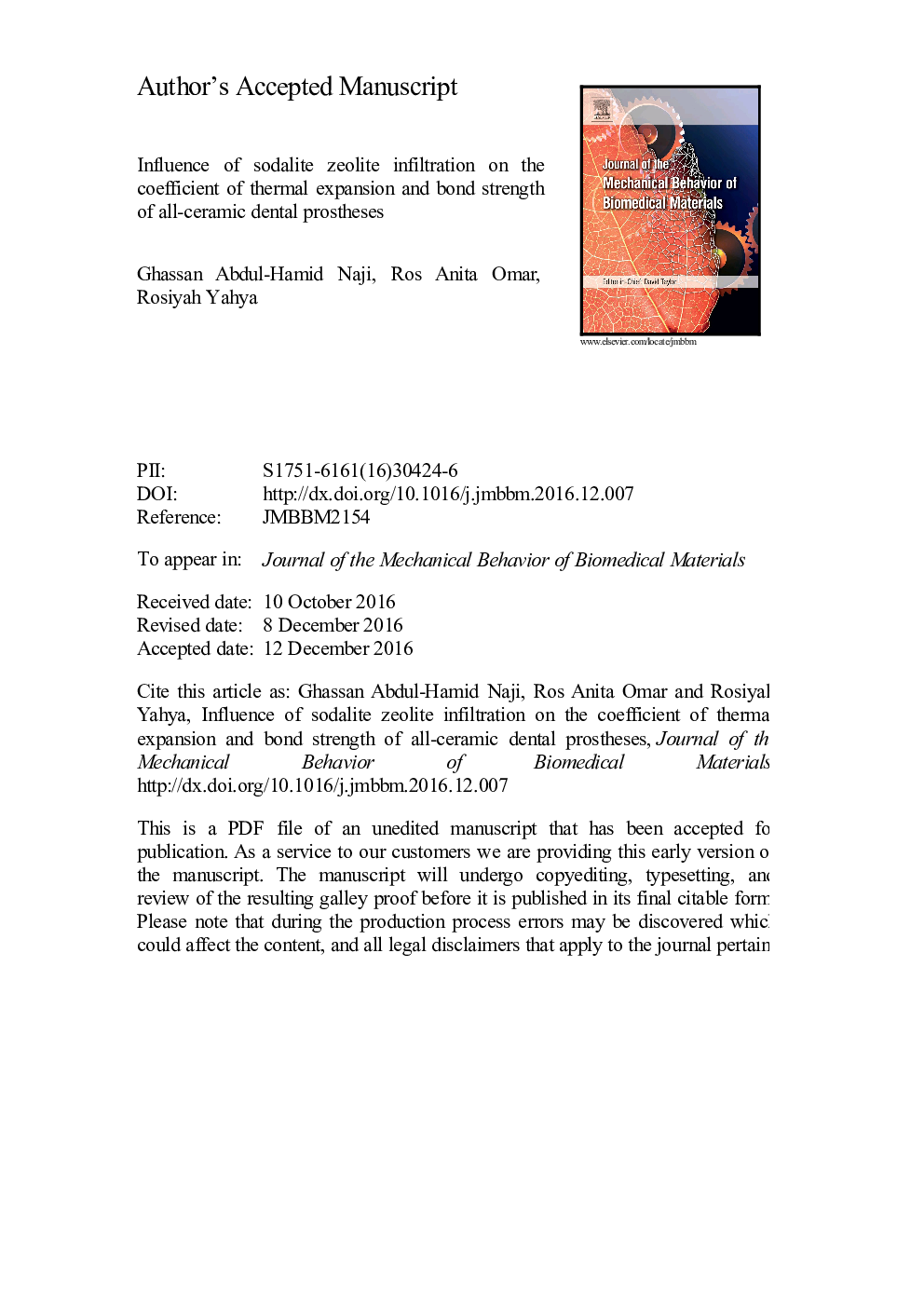| کد مقاله | کد نشریه | سال انتشار | مقاله انگلیسی | نسخه تمام متن |
|---|---|---|---|---|
| 5020760 | 1469078 | 2017 | 31 صفحه PDF | دانلود رایگان |
عنوان انگلیسی مقاله ISI
Influence of sodalite zeolite infiltration on the coefficient of thermal expansion and bond strength of all-ceramic dental prostheses
ترجمه فارسی عنوان
تأثیر نفوذ زئولیت سودالیت بر ضریب انبساط حرارتی و استحکام باند پروتزهای دندانی سرامیکی
دانلود مقاله + سفارش ترجمه
دانلود مقاله ISI انگلیسی
رایگان برای ایرانیان
کلمات کلیدی
موضوعات مرتبط
مهندسی و علوم پایه
سایر رشته های مهندسی
مهندسی پزشکی
چکیده انگلیسی
In all-ceramic systems, a high incidence of veneer chip-off has been reported in clinical studies. Coefficient of thermal expansion (CTE) behaviour is one of the factors that may increase residual stress in the interface and influence the veneer/core bond strength. Therefore, this study aimed to evaluate the effect of sodalite zeolite-infiltration on the CTE behaviour and bond strength of different all-ceramic prostheses. The case-study groups were synthesized sodalite zeolite-infiltrated alumina (IA-SOD) and synthesized sodalite zeolite-infiltrated zirconia-toughened alumina (ZTA) (IZ-SOD), while the control groups were glass-infiltrated alumina (IA-glass) and glass-infiltrated ZTA (IZ-glass). Forty cylindrical-shaped samples measuring 5 mm in diameter and 10 mm in height were tested for CTE using a thermo-mechanical analyser machine, and forty disc-shaped ceramic samples measuring 12 mm in diameter and 1.2 ± 0.2 mm in thickness were prepared using specially designed stainless steel split mould and veneered by cylinder-shaped (2 mm high à 2 mm diameter) low-fusing porcelain (Vita VM7). The veneer/core samples were sintered and tested for shear bond strength using a high precision universal testing machine. Scanning electron microscope, stereo microscope, atomic force microscope, and energy-dispersive X-ray spectroscopy were used to investigate the structural characteristics of samples at the fracture surface. The collected data were analyzed with a one-way ANOVA and Tukey HSD test (α=.05). IZ-SOD revealed highest CTE and shear bond strength values, while the IA-glass revealed the lowest values than the other groups. There was no significant difference in CTE and bond strength among IZ-SOD, IA-SOD and IZ-glass samples (p>0.05). The experimental SOD zeolite-infiltrated samples revealed higher CTE mismatch and bond strength along with a more favourable mode of failure than did the commercial glass-infiltrated samples. Sandblast technique is considered as effective conditioning procedure for enhancing the surface roughness of SOD zeolite-infiltrated frameworks which subsequently improving the bond strength.
ناشر
Database: Elsevier - ScienceDirect (ساینس دایرکت)
Journal: Journal of the Mechanical Behavior of Biomedical Materials - Volume 67, March 2017, Pages 135-143
Journal: Journal of the Mechanical Behavior of Biomedical Materials - Volume 67, March 2017, Pages 135-143
نویسندگان
Ghassan Abdul-Hamid Naji, Ros Anita Omar, Rosiyah Yahya,
